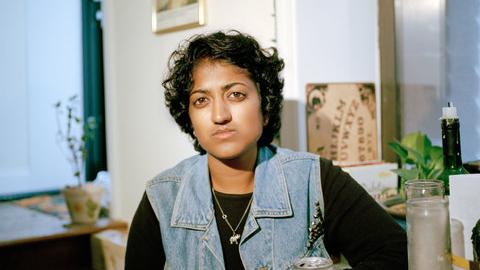Sruti Swaminathan, 22, is the daughter of Indian immigrants. She told photographer Quetzal Maucci that while growing up in the US, she was embarrassed to bring Indian food to school for lunch.
Quetzal Maucci, a 21-year-old photographer, is the daughter of two immigrant mothers from Argentina and Peru. But even growing up in a progressive place like San Francisco, she often felt like an outcast because of her background.
"I still felt uncomfortable being the child of immigrant parents," Maucci remembers. She says she struggled to feel comfortable in her own skin, or even to tell people she was "a confused child."
She thought it was reflective of the schools she attended, believing they hadn't provided her with the support system she needeed. But after speaking with children from other immigrant families around her, she found they experienced the same issues.
Two years ago, she began to photograph these children and document their stories. They came from Argentina, India, Italy and Poland, but their stories had a common theme: They struggled with their identity. Over time, it turned into a project called "Children of immigrants" that was recently featured in the New York Times.
One of Maucci's subjects is Sruti Swaminathan, a 22-year-old Indian American. Swaminathan said she was embarrassed to even take Indian food to school. "I wanted to do what the other kids were doing, like buy pizza on Fridays, bring sandwiches — just try to embrace the American culture in some way because my physical appearance clearly didn’t give off the American vibe of what younger children would perceive it to be," she says.
Maucci felt the same. "Growing up, I wasn't able to realize that I could kind of hold on to my parents' culture while understanding American culture," she says. What Maucci and Swaminathan regret today is feeling ashamed about their cultures. Swaminathan told Maucci that if she could go back, she would take Indian food to school.
Maucci hopes that her project brings more attention to the children of immigrants in the US and all over the world. "I think what struck me is that everyone really resonated with it," she says about the feedback she's received. "I can see that this can connect to so many people."
By making these people more visible, Maucci says, she hopes she can change perceptions of them for the better — and maybe even help remove the stigma from the word "immigrant."
"I don't think it should be something that we should hide," she explains. "I think talking about it is the first step to making it more comfortable for people who are not from here, but call this United States home."
Our coverage reaches millions each week, but only a small fraction of listeners contribute to sustain our program. We still need 224 more people to donate $100 or $10/monthly to unlock our $67,000 match. Will you help us get there today?
